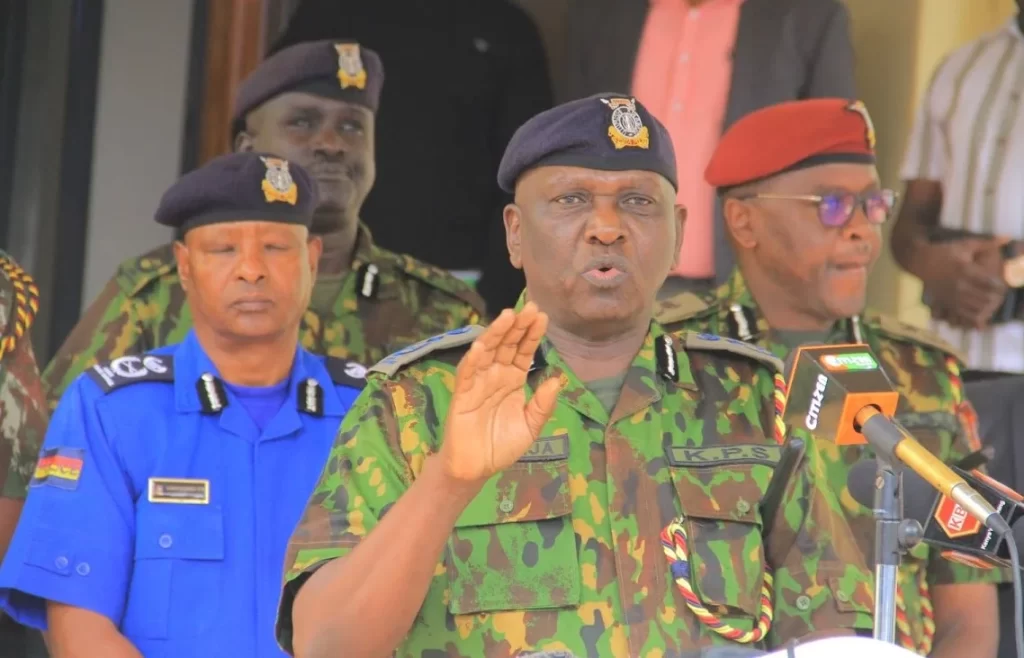
Acting IG Douglas Kanja speaks to the press outside Jogoo House on July 14. IMAGE: Courtesy
In Summary:
1) Acting Inspector General Douglas Kanja states demonstrations are not banned, but organizers must notify police in advance.
2) According to Acting Inspector General Douglas Kanja, the recent directive was to alert the public of potential threats, not to ban protests
3) On Thursday, the High Court in Nairobi suspended Kanja’s directive following an urgent petition filed by Katiba Institute
Acting Inspector General of Police Douglas Kanja clarified on Friday that he has not banned public demonstrations.
In a statement, Kanja explained that his directive issued on Wednesday was intended to inform the public of potential threats associated with the planned demonstrations on Thursday.
“We appreciate the public’s cooperation in adhering to the advisory and refraining from holding demonstrations within the Central Business District and surrounding areas. It is important to clarify that we have not banned public demonstrations,” Kanja stated.
Kanja emphasized that, according to the law, organizers of demonstrations must notify the police in advance about any planned events and the locations where they intend to hold marches.
This requirement aims to ensure safety and security in light of evolving public demonstration dynamics, requiring police to act on intelligence reports and issue guidelines promptly.
“We remind the public that, in accordance with Section 5(3)(a) and (c) of the Public Order Act, any individual who intends to organize a public gathering or procession must notify the Officer Commanding Station (OCS) in charge of the area in writing at least three days but no more than fourteen days prior,” Kanja explained.
“The application should specify the full names and physical address of the organizer, as well as the proposed site of the public meeting or the proposed route in the case of a public procession,” he added.
In his directive on July 17, Kanja acknowledged the constitutional right of Kenyans to peacefully picket but noted that criminals had infiltrated protesting groups, leading to disorderly and destructive conduct.
This trend has resulted in injuries, loss of lives, destruction of property, and loss of livelihoods since the Gen Z protests began on June 18.
Kanja revealed that intelligence indicated goons were planning to infiltrate last Thursday’s protests and carry out attacks, including looting.
He added that the lack of a designated leader for the Gen Z protests made it difficult for police to enforce safety protocols, in accordance with international security standards for public assemblies.
“As a result, no demonstrations will be permitted in the Nairobi Central Business District and its surroundings until further notice to ensure public safety,” Kanja announced.
However, on Thursday, the High Court in Nairobi suspended Kanja’s directive following an urgent petition filed by Katiba Institute.
Justice Bahati Mwamuye issued a temporary order restraining Kanja and any officer within the National Police Service (NPS) from enforcing the order.
The judge directed Kanja to circulate an official communication regarding the court orders to all NPS officers and to file evidence of compliance by Friday, July 19.
Katiba Institute accused Kanja of unilaterally deciding who can exercise the right to assemble, picket, and protest as provided by Article 37 of the Constitution.
“They have turned the police service into a cabal operating as if the Constitution is a mere piece of paper. They have trampled upon the Bill of Rights and other constitutional provisions,” Katiba Institute argued in their petition.
They asserted that it is in the public interest for people to be allowed to demonstrate peacefully and unarmed.
Despite a heavy security presence on the streets of Nairobi on Thursday, no protesters showed up.
It remains unclear whether demonstrators heeded Kanja’s directive or were deterred by the chilly weather.
